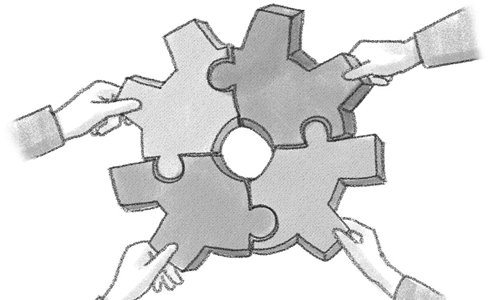HOME >> BUSINESS
Eurasia legislative bodies forum to forge stronger partnership
By Nurlan Nigmatulin Source:Global Times Published: 2019/7/22 19:13:40

Illustration: Xia Qing/GT
On September 23-24, the city of Nur-Sultan will host the fourth meeting of Speakers of the Eurasian Countries' Parliaments titled "Greater Eurasia: Dialogue. Trust. Partnership." This event is important not only for Kazakhstan, but for all European and Asian countries.
The topic proposed by Kazakhstan reflects a course toward the development and strengthening of interaction between the countries of Europe and Asia to formulate safe and sustainable development of Eurasia.
Eurasia is a pillar of the modern world. It is the largest continent, covering 65 percent of the world's population, 75 percent of energy resources and 40 percent of global GDP. At the same time, the diversity of economic systems, the huge imbalance in the level of development between parts of the continent, as well as the increasing trend indicating a move to regionalization, prevent us from describing Eurasia as a single economic entity.
The current level of trade and economic interdependence requires closer interaction from everyone and consideration for the interests of the Eurasian countries.
The main message of Kazakhstan is to position Eurasia as a platform for testing a fundamentally new partnership model based on a joint, collective solution to emerging disagreements between certain states, as well as countering common challenges.
The idea of Eurasian integration of the first President of Kazakhstan, Nursultan Nazarbayev, was first announced in 1994 and, after a number of development stages, it is being implemented through the Eurasian Economic Union (EAEU). This year marks the 25th anniversary of his Eurasian integration initiative.
Subsequently, the strategic initiative to build partnerships across the Eurasian continent, proposed by Nazarbayev, was enshrined in the Astana Declaration of the Organization for Security and Cooperation in Europe (OSCE) in 2010. The member states of the Organization declared their commitment to the principle of a common and indivisible Euro-Atlantic and Eurasian community.
In 2015, in his statement from the rostrum of the UN General Assembly, the first President of Kazakhstan proposed the idea of creating a Greater Eurasia, which means uniting the Eurasian Economic Union, the Silk Road Economic Belt and the European Union into a single integration project.
The unprecedented Big Eurasia project enables the harmonization of the work of these initiatives, including the liberalization of trade relations between their participants, the joint development of transport corridors, the diversification of energy routes, the expansion of investment cooperation and other issues of economic interaction.
In April 2019, at the session of the second Belt and Road Forum for International Cooperation in Beijing, Nursultan Nazarbayev invited the world community to create a new geopolitical reality "Three D," which proposes to establish the "Three Dialogues."
The first dialogue is at the global level between the US, Russia, China and the European Union.
The second dialogue is needed at the level of Eurasia in order to unite the capabilities of the Conference on Interaction and Confidence Building Measures in Asia and the Organization for Security and Cooperation in Europe.
The third dialogue is a systematic economic dialogue between the Eurasian Economic Union, the European Union, the Shanghai Cooperation Organization and the Association of Southeast Asian Nations. The development of economic cooperation in such a format can, firstly, give a powerful impetus to the development of our countries, the growth of economies and the improvement of the wellbeing of citizens.
Secondly, it can create new sources of diversification, strengthening competitiveness, improving the business climate and increasing the investment attractiveness of states. Thirdly, it can transform into a signal to enhance the global role of Greater Eurasia.
The launch of these dialogues is in the common interest of all European and Asian countries and will contribute to the formation of interconnections for a sustainable future of the united Eurasia.
Therefore, the main objective of the fourth meeting of Speakers of the Eurasian Countries' Parliaments is to establish a direct multilateral dialogue between the heads of legislative bodies of Europe and Asia, as well as heads of international and inter-parliamentary organizations to further deepen and expand cooperation in the Eurasian space.
The role of parliaments and top legislative bodies in identifying key areas of political and economic development of states will act as a strong foundation for finding common points of interaction and mutually acceptable solutions at the regional and continental levels.
The heads of Eurasian parliaments and top legislative bodies from 84 European and Asian countries and the heads of 16 international and inter-parliamentary organizations have been invited to the forum in Nur-Sultan.
Currently, we are carrying out huge organizational and preparatory work. So far, members of parliaments and top legislative bodies from more than 50 countries have confirmed their participation, including senior representatives and lawmakers from 43 countries. All 16 international organizations have confirmed their attendance.
The participation of influential parliamentarians and lawmakers from Europe and Asia in the forum will provide an opportunity to exchange views on topical issues of development, as well as find a vision and practical recipes for moving toward a viable universal win model for Eurasia.
The outcome of the discussion, we hope, will be the adoption of the final document - the Joint Statement of the Speakers - which reflects the views of participants on the further development of the Eurasian continent on the way to our common future.
Ultimately, the upcoming forum will contribute to the strengthening of comprehensive interaction and cooperation in the Eurasian space, and the development of contacts and partnership among legislative bodies.
The author is chairman of the Lower House of the Parliament of the Republic of Kazakhstan. bizopinion@globaltimes.com.cn
Posted in: INSIDER'S EYE